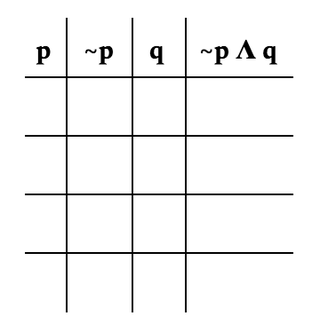What are the three main types of logic used for truth tables and their symbols?
AND ∧
OR ∨
NOT ¬
What is the difference between * and **?
* multiplication
** exponent
How is Dijkstra's algorithm used in the read world?
Used for IP routing to find servers
[ a b ] --> [ d -b ]
[ c d ] [ -c a ]
What is the difference between selection sort and bubble sort?
Selection sort--finds the largest value in the list and switches the position of [-1] to where the largest value was.
Bubble sort--compares a value to the values next to it, 'hopping' through the list
Write a truth table for the following:
¬A ∧ ¬B
A B Output
0 0 1
0 1 0
1 0 0
1 1 0
What is the output of the following code given a= 1, b=3, c=2
while c < 5:
if a != 7 and b <= 12:
a += 2
b = b*2
c += 1
A = 7
B = 12
C = 4
Evaluate the following:
0: (0--0, 1--4, 2--8, 3--inf, 4--inf)
1: (0--0, 1--4, 2,--8, 3--inf, 4--10)
2: (0--0, 1--4, 2,--8, 3--10, 4--6)
3: (0--0, 1--4, 2,--8, 3--10, 4--6)
4: (0--0, 1--4, 2,--8, 3--10, 4--6)
Find the inverse of the key matrix and decrypt the message 'WQPTJE' :
K = [ 2 1 ]
[ 3 2 ]
SEND IT
Sort the following list using selection sort:
arr = [5, 3, 8, 1, 2]
1st pass: arr = [5, 3, 2, 1, 8]
2nd pass: arr = [1, 3, 2, 5, 8]
3rd pass: arr = [1, 2, 3, 5, 8]
Fill in the following truth table, with ~ meaning not.

p ~p q ~p∧q
0 1 0 0
0 1 1 1
1 0 0 0
1 0 1 0
What is the output of the following code:
numbers = [2, 4, 6, 9, 10]
all_even = True
for num in numbers:
if num % 2 != 0:
print(num, 'is odd')
all_even = False
print(num, "is even")
2 is even
4 is even
6 is even
9 is odd
Evaluate the following:
B: A--0, B--8, C--5, D--9, E--inf
C: A--0, B--8, C--5, D--9, E--16
D: A--0, B--8, C--5, D--9, E--11
E: A--0, B--8, C--5, D--9, E--11
Using the key, encrypt the message 'only me'
[ 7 3 ]
[ 2 1 ]
CGDIWR
Use bubble sort to sort the following list:
[4, 7, 2, 12, 33, 1, 43]
1st pass: [4, 2, 7, 12, 1, 33, 43]
2nd pass: [2, 4, 7, 1, 12, 33, 43]
3rd pass: [2, 4, 1, 7, 12, 33, 43]
4th pass: [2, 1, 4, 7, 12, 33, 43]
5th pass: [1, 2, 4, 7, 12, 33, 43]
Write a truth table for the following:
(¬A) ∧ (B ∨ C)
A B C ¬A B ∨ C Output
0 0 0 1 0 0
0 0 1 1 1 1
0 1 0 1 1 1
0 1 1 1 1 1
1 0 0 0 0 0
1 0 1 0 1 0
1 1 0 0 1 0
1 1 1 0 1 0
What is the output of the following code if x=4 and y=2?
for i in range(0, 11):
x += (x*2)
while x <= 100:
y = y**2
X = 400
Y = 16
Evaluate the following:

A: A--0, B--7, C--inf, D--inf, E--1
B: A--0, B--7, C--10, D--inf, E--1
C: A--0, B--7, C--10, D--16, E--1
D: A--0, B--7, C--10, D--16, E--1
E: A--0, B--7, C--3, D--8, E--1
Find the inverse of the key and decrypt the following message, “KLYAOD” using the following key:
[ 2 3 ]
[ 3 5 ]
FOUR PM
Use both selection and bubble sort to sort the following list and find which method is more efficient:
[3, 19, 34, 21, 51, 67, 49]
Bubble sort: 1) [3, 19, 21, 34, 51, 49, 67]
2) [3, 19, 21, 34, 49, 51, 67]
Selection sort: 1) [3, 19, 34, 21, 51, 49, 67]
2) [3, 19, 34, 21, 49, 51, 67]
3) [3, 19, 21, 34, 49, 51, 67]
Write a truth table for the following circuit:

A B ¬A A∨B ¬A∧B (¬A∧B) ∨ (A)
0 0 1 0 0 0
0 1 1 1 0 1
1 0 0 1 0 1
1 1 0 1 0 1
What is the output of the following code given lis=[2, 3, 7, 23, 8]?
for i in lis:
while i < 10:
i = i*10
if i // 3 == 0:
print(i, "is a lucky number")
else:
i = 0
print(lis)
30 is a lucky number
[0, 30, 0, 23, 8]
Evaluate the following:

A: A--0, B--4, C--5, D--inf, E--inf, F--inf
B: A--0, B--4, C--5, D--15, E--11, F--inf
C: A--0, B--4, C--5, D--15, E--8, F--inf
D: A--0, B--4, C--5, D--15, E--8, F--15
E: A--0, B--4, C--5, D--15, E--8, F--14
F: A--0, B--4, C--5, D--15, E--8, F--14
Encrypt the message 'Computer' using the following key:
K = [ 5 2 ]
[ 2 1 ]
IUSPOSIB
Use both selection sort and bubble sort to sort the following list and determine the efficiency of each:
[23, 12, 3, 71, 68, 35, 9]
Bubble sort: 1) [ 12, 3, 23, 68, 35, 9, 71]
2) [3, 12, 23, 35, 9, 68, 71]
3) [3, 12, 23, 9, 35, 68, 71]
4) [3, 12, 9, 23, 35, 68, 71]
5) [3, 9, 12, 23, 35, 68, 71]
Selection sort: 1) [23, 12, 3, 9, 68, 35, 71]
2) [23, 12, 3, 9, 35, 68, 71]
3) [9, 12, 3, 23, 68, 35, 71]
4) [9, 3, 12, 23, 68, 35, 71]
5) [3, 9 12, 23, 68, 35, 71]